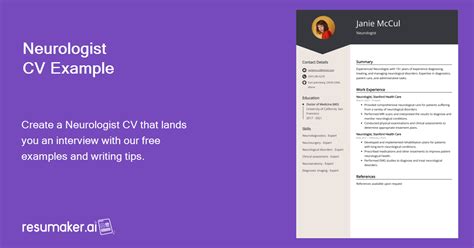Neurology, a specialized branch of medicine, delves into the intricate workings of the nervous system, encompassing the brain, spinal cord, and peripheral nerves. Neurologists serve as detectives of the neurological realm, diagnosing and treating an array of conditions that affect these vital structures.

Job Description: Unraveling the Mysteries of Neurology
Neurologists perform comprehensive evaluations of patients, meticulously assessing their neurological symptoms, conducting physical examinations, and utilizing advanced diagnostic tools such as imaging techniques (e.g., MRI, CT scans) and electroencephalograms (EEGs). Based on their findings, they formulate individualized treatment plans, leveraging medications, therapies, and surgical interventions as necessary.
Educational Journey: A Path to Neurological Expertise
Aspiring neurologists embark on a rigorous academic journey. The path typically involves completing an undergraduate degree in a science-related field, followed by four years of medical school. Upon graduation, they undertake a three-year residency program in neurology, during which they receive hands-on training in patient care, diagnosis, and treatment.
Day-to-Day Responsibilities: A Symphony of Neurological Care
A day in the life of a neurologist is a multifaceted tapestry of responsibilities. They engage in:
- Patient Consultations: Meeting with patients, listening attentively to their symptoms, and conducting thorough examinations to identify neurological impairments.
- Diagnostic Procedures: Utilizing a range of diagnostic tests, including blood work, imaging, and EEGs, to pinpoint the underlying causes of neurological conditions.
- Treatment Planning: Developing and implementing individualized treatment plans, considering the patient’s specific needs and symptoms, and monitoring their progress closely.
- Collaboration: Working closely with other healthcare professionals, such as neurosurgeons, physical therapists, and occupational therapists, to provide optimal patient care.
- Research: Advancing the field of neurology through research and clinical trials, contributing to the discovery of new treatments and therapies.
Clinical Expertise: Navigating Neurological Disorders
Neurologists possess expertise in a wide spectrum of neurological disorders, including:
- Stroke: Evaluating and treating patients who have experienced a stroke, providing immediate care and implementing rehabilitation strategies.
- Epilepsy: Diagnosing and managing different types of seizures, working closely with patients to develop effective treatment plans.
- Alzheimer’s Disease: Providing early diagnosis, managing symptoms, and supporting patients and their families throughout the course of the disease.
- Multiple Sclerosis: Monitoring and managing the progression of multiple sclerosis, implementing therapies to alleviate symptoms and enhance quality of life.
- Parkinson’s Disease: Diagnosing and treating Parkinson’s disease, prescribing medications and recommending therapies to manage symptoms and improve daily functioning.
The Neurology Landscape: A Snapshot
According to the American Academy of Neurology, there are approximately 16,000 neurologists practicing in the United States. The demand for neurologists is projected to grow by 18% from 2021 to 2031, driven by an aging population and increasing prevalence of chronic neurological conditions.
Pain Points: Navigating Challenges
Neurologists encounter various challenges in their practice, including:
– Complexity of Neurological Disorders: Dealing with complex and often debilitating neurological conditions that can present with diverse symptoms and require multifaceted treatments.
– Evolving Technologies: Keeping up with rapidly evolving diagnostic and treatment technologies, ensuring the utilization of the most up-to-date approaches.
– Communication Barriers: Effectively communicating medical information to patients and their families, especially when dealing with cognitive or language impairments.
Motivations: Driving Neurologists’ Passion
Neurologists are motivated by a deep desire to:
– Alleviate Suffering: Providing compassionate care to patients with often life-altering neurological conditions, alleviating their symptoms and improving their quality of life.
– Advance Scientific Knowledge: Contributing to the advancement of neurology through research and innovation, discovering new treatments and therapies that benefit patients.
– Educate and Advocate: Raising awareness about neurological disorders, empowering patients and their families, and advocating for their needs within the healthcare system.
Common Mistakes to Avoid: Ensuring Quality Care
Neurologists strive to avoid common pitfalls that may compromise patient care:
– Overreliance on Technology: While diagnostic tools are essential, relying solely on them can lead to overlooking subtle clinical findings.
– Incomplete Examinations: Thorough neurological examinations are crucial for accurate diagnoses, avoiding the potential for missed or delayed diagnosis.
– Insufficient Patient Education: Providing clear explanations and empowering patients with knowledge about their condition is essential for informed decision-making and adherence to treatment plans.
Pros and Cons: Weighing the Advantages and Challenges
Pros:
- Intellectual Stimulation: Engage in complex diagnostic and treatment challenges that demand sharp analytical thinking and problem-solving skills.
- Job Security: High demand for neurologists, ensuring job stability and earning potential.
- Meaningful Impact: Making a tangible difference in the lives of patients by alleviating their neurological impairments and improving their well-being.
Cons:
- Intense Training: Rigorous educational journey and demanding residency program, requiring significant time and effort.
- Emotional Toll: Dealing with patients facing life-altering neurological conditions can be emotionally taxing.
- Long Work Hours: Unpredictable schedules and frequent on-call responsibilities may lead to extended work hours and a potential impact on work-life balance.
Unlocking New Horizons: The Future of Neurology
The future of neurology holds immense promise with continuous advancements in technology and research. We can anticipate:
- Precision Medicine: Utilizing genetic and molecular testing to tailor treatments to individual patients, maximizing treatment effectiveness and minimizing side effects.
- Neuroimaging Innovations: Advancements in neuroimaging techniques, offering unparalleled visualization of the brain and spinal cord, aiding in diagnosis, treatment planning, and monitoring disease progression.
- Brain-Computer Interfaces: Exploring the potential for brain-computer interfaces to assist patients with severe neurological impairments, enabling communication, mobility, and interaction with the environment.
Conclusion: Embracing the Neurologist’s Role
Neurology offers a uniquely rewarding career path for those driven by compassion, intellect, and a desire to make a meaningful impact on the lives of others. Neurologists serve as guardians of the nervous system, navigating the complexities of neurological disorders to provide exceptional care and advance the field through research and innovation. As the field continues to evolve, neurologists remain at the forefront of unlocking the mysteries of the human brain and spinal cord, shaping the future of neurological health.
